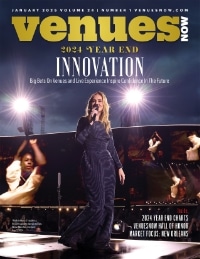RED ALERT: Sports Illustrated Stadium, shown here in a rendering, is the first naming rights deal for the iconic brand, and includes taking over primary ticketing at the New York Red Bulls’ venue in 2026. (Courtesy venue)
Primary ticketing key piece of deal
Major League Soccer’s New York Red Bulls made a big splash this week by announcing a new naming rights deal with Sports Illustrated to rebrand Red Bull Arena as Sports Illustrated Stadium.
Financial terms of the 13-year agreement were not disclosed, but sports marketing experts estimated the value at $5 million to $7 million annually, given the market, the stadium’s age and the rebranding elements.
Sports Illustrated Stadium, with 25,000 capacity, opened in 2010 in Harrison, New Jersey. It’s the first deal of its kind for the 70-year-old brand, and takes effect immediately.
Given the stadium’s rebrand, for some observers, the biggest component of the deal is Sports Illustrated Tickets, part of the brand’s digital portfolio, will take over primary ticketing from Ticketmaster starting with the 2026 season, as well as serving as the team’s official resale partner.
For Sports Illustrated, it’s also their first big league stadium account for primary ticketing, tied to Box Office, its software system using blockchain technology. The Red Bulls will match their internal IT team with Sports Illustrated’s team of engineers and blockchain consultant Ava Labs to form the stadium’s new ticketing system.
Ticketmaster ran the venue’s ticketing for the past 15 seasons.
To this point, SI Tickets had been mostly a secondary ticketing platform that has deals with the NFL and individual teams, among other clients.
Ticketing experts say it’s a big leap of faith for both the vendor and the MLS team, given that Sports Illustrated has been in the ticketing business for only three years, starting with the secondary market before expanding to primary in 2023; plus, the infrastructure required to run a primary ticketing program at the highest level of sports; and the fact that SI’s publishing business has been on shaky financial ground over the past five years.
Authentic Brands acquired the SI brand in 2019 for $82 million and has since diversified its portfolio to include ticketing and hospitality partnerships. On the publishing side, in March, Minute Media signed a 10-year licensing deal to take over Sports Illustrated’s digital and print editions after Authentic Brands laid off a big chunk of editorial staff in January under previous publisher The Arena Group.
David Lane, CEO of Sports Illustrated Tickets, recognizes Ticketmaster is best in class for ticketing services. His company is early in its life cycle and learning as it grows as a ticketing vendor. Officials with the firm said more than 300 events have used the system for free and paid events, including the Quad City Air Show in Iowa, Alaska Celtic festival, Maple Grove Raceway in Pennsylvania and the Metro Elite Classic Showcase in New Jersey.
The Red Bulls deal is the first step toward signing more primary ticketing deals with big league venues, Lane said.
“We have ambitions,” he said. “We’ve seen where our competitors have found strength in the marketplace. With primary, secondary and hospitality (assets) as well, we can leverage the brand to improve our business. Other deals will come sooner and we’ll announce them as we go forward. We can be competitive and don’t have to be disruptive.”
Marc de Grandpré, president and general manager of the Red Bulls, said the Sports Illustrated Tickets piece is more extensive than just scanning digital tickets at the gates.
“With this new technology, we’ll be able to communicate with the fans, give them a personalized message when they walk in the building,” de Grandpré said. “During the match, they can upload photos and create SI covers for themselves and bring that to life.”
Discussions between the Red Bulls and Sports Illustrated started about eight months ago after Fred Mangione, a New York consultant, made the introduction between the two parties, de Grandpré said.
There was an ebb and flow to those talks before things heated up mid-summer before eventually reaching an agreement.
“We had been in the market quietly and patiently for a long time,” de Grandpré said. “For us to take our name off the building, it needed to be a meaningful partnership and all those pieces came together at the right time. SI is a 70-year-old brand and Red Bull is entrenched in entertainment and culture. Bringing those two together made lot of sense.”
Mangione knew the Red Bulls were searching for a new naming rights partner, but he didn’t think that Sports Illustrated would get to a level the team needed to sign a deal.
“What started as hospitality turned into a bigger play,” Mangione said. “With the brand of SI, there’s so many things both sides can do together. You can expand more that just the name on what you can do as far as activating with each other.”
Additional assets for Sports Illustrated include Club SI, a new 1,000-person stadium club activated on game days that could potentially be open on non-event days, and visual presentations around the building, connected to the history of soccer in New Jersey.
Overall, naming rights revenue will be used to pay for multiple upgrades valued in the eight figures, de Grandpré said.
Improvements will include a larger club space to accommodate 600 to 800 people, something missing from the stadium in its current setup, he said.
Next season, a new product called Box Seats open, an all-inclusive club package revolving around 188 plush seats situated midfield, close to the pitch.
In general, premium seating will jump from about 4% of total seating to 15%, a reflection of the greater demand for higher-end experiences across MLS as more sophisticated stadiums have come online over the past decade.
“If you look at New York City Football Club (and its stadium development) and LAFC, they’ve got about 25% premium,” de Grandpré said. “Columbus is increasing again and they opened (in 2021).”








